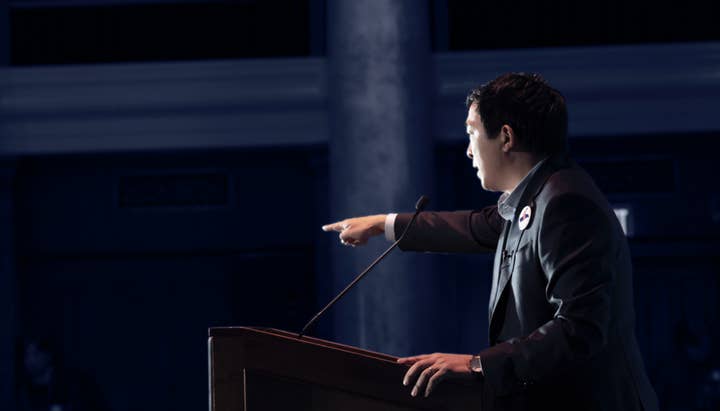Andrew Yang: "Games are intrinsic to the human experience"
Democratic presidential candidate shares views on loot boxes, Blitzchung situation, gaming addiction
For all the tech, legal, political, and cultural issues that intersect with the gaming industry, it's rare to see a president or presidential candidate address video game-specific topics directly. That's changed this year with Democratic presidential candidate Andrew Yang.
In an interview with the Washington Post today, the tech-focused entrepreneur candidate gave his stance on several gaming-specific issues, including loot boxes, gaming addiction, violent games, and the ongoing controversy surrounding Hearthstone pro Blitzchung's pro-Hong Kong protest following a match, and the subsequent punishment handed down by Blizzard.
Specifically on Blitzchung's six-month ban, which has already been condemned by a bipartisan group of legislators last week, Yang opposed Blizzard's decision. However, he also views the situation as part of a greater problem of the increasing challenge of major companies making decisions connected with complex politics, suggesting the solution might be some level of government involvement.
"What we're seeing now is two of China's driving priorities starting to be at odds with each other," he said. "Their priority is maintaining robust economic growth. Number two is social order and suppressing any political dissidence...The unfortunate reality is that these are the kinds of decisions we're forcing companies to make every single day because of the globalized nature of the industry.
"A lot of these companies are like, 'Why am I making these decisions?' And these decisions end up being massive investments of resources. They're actually looking for some sort of guideline or assistance. These are from companies who have historically not been excited about having any government hand in their industries. It just goes to show we're putting more and more companies into untenable positions."
On loot boxes, Yang called for more transparency from developers as to the odds of getting certain types of loot (something that most industry leaders have been pushing toward for some time now), and described microtransactions as a contract entered into between a publisher and a player.
"We need to be able to empower players to express their economic preferences up front," he said, though he added that it was "perfectly understandable" for companies to monetize where they were able.
On the topic of gaming addiction (an issue that was in the news earlier this week when an Oxford study did not find "sufficient evidence exists to warrant thinking about gaming as a clinical disorder in its own right"), Yang called for more widespread recognition of the concerns. He's previously shared articles on social media to similar effect, indicating support of the WHO's decision to classify gaming disorder as a recognized illness earlier this year.
However, Yang has dismissed the idea that violent games inspire actual violence, saying that attitude comes from being uninformed about what games actually are. For comparison, he pointed to the lawmakers who interrogated Facebook CEO Mark Zuckerberg in a hearing last year, who ended up asking questions that betrayed a misunderstanding of how Facebook, social media, and the internet at large actually worked.
"They misunderstood Facebook and they're certainly behind the curve when it comes to artificial intelligence," he said. "And for video games, no one ever talks about it unless it's in the context of violence, and even then you just get some hand wringing behind it."
"To me, games are intrinsic to the human experience, and video games are a natural evolution. There is vast potential for gaming to serve not just for our entertainment, but for other positive things."

